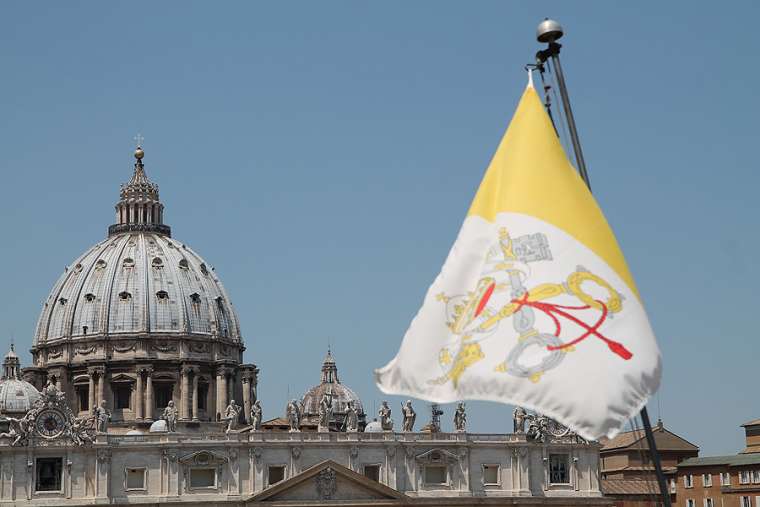Credit: Bohumil Petrik/CNA.
The Vatican Secretary of State yesterday consecrated as a bishop Ante Jozić, who was appointed apostolic nuncio to Belarus in May. Archbishop Jozić was welcomed by the president of the Belarusian bishops’ conference, who has been exiled.
Belarus has seen widespread protests in recent weeks following a disputed presidential election. Protests began 9 August after president Alexander Lukashenko was declared to have won that day’s election with 80% of the vote. Lukashenko has been president of Belarus since the position was created in 1994.
Relations between the Holy See and Belarus are strained by the invalidation of the passport of Archbishop Tadeusz Kondrusiewicz of Minsk-Mohilev. He was blocked from returning to Belarus from Poland by border guards 31 August.
Archbishop Jozić, 53, was appointed apostolic nuncio to Belarus 21 May.
He was consecrated a bishop by Cardinal Pietro Parolin in Solin, Croatia, just outside Split.
Archbishop Kondrusiewicz wrote to the nuncio, saying: “Your Excellency, on the day of your episcopal ordination, I cordially greet you on my own behalf, as well as on behalf of the Conference of Catholic Bishops in Belarus and all Catholics of our country … For the development of our pastoral and social activities, as well as relations with the state at this turning point in our history, we need your support as a representative of the Holy See.”
“Therefore, we look forward to your arrival in Belarus, where you will perform the ministry entrusted to you by the Holy Father Francis,” the Minsk-Mohilev archbishop added.
Archbishop Jozić was born in Trilj, about 25 miles northeast of Split, in 1967. He was ordained a priest of the Archdiocese of Split-Makarska in 1992, and began preparing for diplomatic service to the Holy See in 1995 at the Pontifical Diplomatic Academy, studying canon and civil law.
Beginning in 1999 he served at the nunciatures in India and Russia. He is also reported to have worked in Hong Kong and as an adviser to the Filipino nunciature.
He was appointed apostolic nuncio to Ivory Coast and Titular Archbishop of Cissa in February 2019. He was to have been consecrated a bishop that May, but he was hospitalized in critical condition after a car accident in early April.
Archbishop Kondrusiewicz’ passport will no doubt play an important role in Archbishop Jozić’s early days as nuncio to Belarus.
Archbishop Paul Richard Gallagher, the Vatican’s Secretary for Relations with States, met with Vladimir Makei, the Belarusian foreign minister, on the first of a four-day visit to Belarus.
During the talks, Makei renewed an invitation to Pope Francis to visit Belarus. The Vatican has asked that Archbishop Kondrusiewicz be permitted entry to the country.
Last week, Archbishop Kondrusiewicz received a reply signed by Anatoly Lappo, chairman of the border committee, stating that the archbishop was blocked from entering the country “in connection with the decision made by the internal affairs bodies to invalidate the passport of a citizen of the Republic of Belarus.”
The archbishop is appealing to the Belarusian interior ministry over the invalidation of his passport.
Archbishop Kondrusiewicz was born in 1946 in Odelsk, in what was then the Byelorussian Soviet Socialist Republic (part of the USSR), to an ethnic Polish family. The Byelorussian SSR was succeeded in 1991 by the Republic of Belarus.
Archbishop Kondrusiewicz travelled last weekend to Lithuania, preaching Sept. 13 at the Marian shrine of Šiluva, thanking Catholics there for their prayers for Belarus.
The archbishop has spoken in defence of protests following last month’s presidential election and demanded an investigation late in August into reports that riot police blocked the doors of a Catholic church in Minsk while clearing away protesters from a nearby square.
He met with Interior Minister Yuri Karaev 21 August to express his concerns about the government’s heavy-handed response to the protests, and he outside a prison 19 August where detained protesters were reported to have been tortured.
Archbishop Kondrusiewicz told CNA that “at the present time, we are asking for prayer, not only for the Catholic Church but for a peaceful solution for the situation in Belarus because I’m very much afraid of civil war. The situation is very, very difficult, very critical.”
Lukashenko visited Russian President Vladimir Putin securing a $1.5 billion loan.
Protests have taken place across Belarus since the August election, and thousands of protesters have been detained. At least four people have died in the unrest.
US Secretary of State Mike Pompeo has said the election “was not free and fair,” citing “severe restrictions on ballot access for candidates, prohibition of local independent observers at polling stations, intimidation tactics employed against opposition candidates, and the detentions of peaceful protesters and journalists.”
Electoral officials said that the opposition candidate, Sviatlana Tsikhanouskaya, earned 10% of the vote. She was detained for several hours after complaining to the electoral committee and has fled to Lithuania.
After the reciting the Angelus 13 September, Pope Francis appealed to governments around the world to respect the “just aspirations” of protesters.
While the pope did not mention any countries by name, Bishop Aliaksandr Yasheuski, an auxiliary bishop of Minsk-Mohilev, noted that the pope’s appeal was relevant to Belarus.
The pope said: “While I urge the demonstrators to present their demands peacefully, without giving in to the temptation of aggression and violence, I appeal to all those with public and governmental responsibilities to listen to the voice of their fellow citizens and to meet their just aspirations, ensuring full respect for human rights and civil liberties.”
Source: CNA

